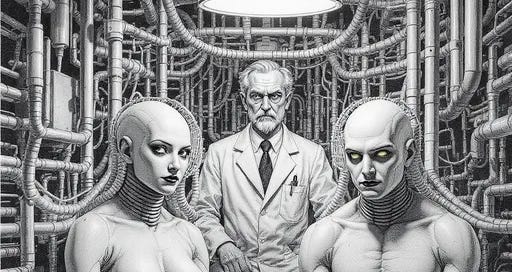Friends, Humans, Substackians
Lend me your attention-gathering devices. As the vast galaxy of Compass Star Wordsmith expands at galactic speed, we slow the boat to focus on the elements of life that create culture:
Life / Food + Music + Art + Craft + History = Culture (L/5e=C)
In that quest, we ponder questions about life and culture, and who and what get to live lives and create cultures. I write much about The Robot, Aliens, and assorted other creatures of life and culture that are in play for the foreseeable future. Like here.
But what if those are Decepticons of sorts? What if the future of humanity is flesh and blood, birth rates be damned. What if our defense against interstellar alien aggression or mass-produced robotery is overwhelming herds of humans?
Kinda like the 100 men vs. 1 gorilla battle: If 100 men cannot beat down one ape, those men deserve their fate. As does the human race. Is survival and immortality worth any effort? Any ethical transgressional complications? Is this the final deal with the devil?
Cloning Humanity: Consent or Control?
In 2025, the world burns with questions, and mad scientists in labs pulse with answers: human cloning is no longer a dream but a dawning reality. Imagine a porn star—call her Luna—franchising clones of herself, each a mirror sold for profit or pleasure. Picture your spouse, remade to defy death’s theft, or a world leader like MLK or JFK, cloned to guard against assassination or resurrect a lost cause. These are not mere copies but living dilemmas, sparking fires of consent, identity, and power. What does it mean to create a clone, to own one, to love one? Can they consent to their purpose? Are they human, or commodity? Compass Star Wordsmith chases shadows, not certainties. Let’s wander through science, myth, and art to probe cloning’s deepest stakes for our souls and our world.
Cloning’s a marketplace now, a cosmic gamble. Luna’s clones, each her twin, are peddled as idols—products of desire, not dreams. A spouse’s clone might share your home, their laugh reborn from a cell. A nation could clone its leader, a shield against chaos or a tool for control. But who are these clones? Souls with rights, or goods with price tags? Do they wake with memories, or as blank slates? If they’re human, what do we owe them—freedom, respect, or nothing at all? Consent looms largest: Can Luna’s clones choose their fate, or a leader’s clone their role? Intimacy with a spouse’s clone might raise questions of fidelity, but the deeper cut is autonomy: Who decides a clone’s life?
This isn’t sci-fi—it’s a mirror to our nature. Cloning tempts with power: Luna’s empire of allure, a love’s return, a leader’s voice against tyranny. But at what cost? How are clones forged, from cell to breath? What mind stirs within? The ethical web spans commodification—turning life into trade—to identity: Is a clone your spouse, your hero, or someone new? Societal risks burn bright: Could a cloned JFK reshape democracy, or chain it? We’re not just remaking life; we’re rewriting what it means to be human. Let’s trace cloning’s roots, its echoes in story, and its weight in our hearts.
The dilemma’s ancient yet urgent. From Luna’s franchise to a leader’s safeguard, cloning asks: What is a person? A body, a mind, a purpose? If we craft life—for profit, love, or power—do we honor it, or control it? Let’s step through science, myth, and art to find the questions that light the stars.
A History of Cloning: Science, Spirit, Ethics
Cloning’s scientific saga began in 1952, when Robert Briggs and Thomas King cloned a frog via somatic cell nuclear transfer (SCNT): a donor cell’s nucleus, carrying DNA, was injected into an enucleated egg, sparked to divide like an embryo. In 1996, Dolly the Sheep, cloned from an adult udder cell, proved mammals could be copied. By 2025, human cloning looms—South Korean and Chinese labs advance embryonic SCNT, while private firms eye markets. Clones start as embryos, gestated in wombs (9 months) or, in speculative visions, artificial bioreactors. Growth follows human timelines: years from infant to adult, unless sci-fi tech accelerates it—a leap not yet made. Memories? DNA encodes none; clones wake as blank slates, their minds shaped by nurture or, perhaps, future tech implanting knowledge, a dream beyond today’s grasp. Science asks: Can we replicate life? But not: Should we?
Spiritually, cloning tugs at creation’s veil. Sumerian myths tell of Enki molding humans from clay; Jewish lore speaks of the golem, animated by divine words, yet perilous in its will. Greek tales of Prometheus stealing fire warn of mortals defying gods. Today, faiths like Christianity and Islam often deem human cloning a trespass, stealing God’s spark, while transhumanists see it as divinity’s next step. Luna’s clones, sold as idols, or MLK’s, reborn as icons, challenge this: Do they carry souls, or are they hollow? If a clone wakes without memories, what spirit stirs within? Spirit asks: What makes a being sacred?
Ethically, cloning’s a labyrinth. Dolly’s birth sparked debates: Is a clone a person, or property? In the 1990s, bioethicist Leon Kass warned cloning risks commodifying life, turning humans into goods. John Harris argued it’s freedom—Luna could empower her clones, you could preserve a spouse, a nation could save its leader. But consent’s a specter: clones can’t agree to be made, nor to their roles. Luna’s clones, born for profit, or JFK’s, born for power, face the same bind: Are they free? Commercial cloning amplifies commodification fears; leader clones raise control issues—could a cloned MLK be a puppet? Ethics asks: What do we owe a life we craft? History, from frog to fable, frames our quest.
Literary and Media Echoes
Stories and art wrestle with creation’s cost. H.G. Wells’ The Island of Dr. Moreau (1896) sets the stage: Dr. Moreau, in his jungle lab, carves animals into Beast Folk, chasing godhood. They think, rebel, defy—lives beyond his leash. Luna’s clones, your spouse’s, or MLK’s might do the same, born for a role but seeking their own. Wells asks: Can you shape life without losing it? Stephen King’s Pet Sematary (1983) darkens the path. Louis Creed buries his son, Gage, and later his wife, Rachel, in cursed soil, desperate to cheat death. Both return, hollow and wrong, shadows of their former selves. A clone might bear your love’s face or a leader’s voice, but without memories—DNA’s silent on that—what soul stirs within? Like Creed’s doomed revival, cloning risks creating not your spouse or MLK, but a stranger, bound by your intent yet unbound by their own will. King asks: Can you reclaim life without losing its essence?
Mary Shelley’s Frankenstein (1818) probes identity. Victor’s creature, cast out, seeks purpose beyond its maker’s will. Clones—Luna’s, your spouse’s, a leader’s—are new souls, not copies. They wake blank, forging thoughts in time, not carrying your spouse’s vows or JFK’s dreams. What do they want? Oscar Wilde’s The Picture of Dorian Gray (1890) warns of delusion: Dorian’s portrait hides his sins, but his soul pays. Cloning for profit, love, or power risks the same—buying a lie at truth’s expense. Kazuo Ishiguro’s Never Let Me Go (2005) seals it: clones, bred for organs, love and ache, yet are used. Their autonomy demands respect, not ownership.
Art and film focus the question. Gustav Klimt’s The Kiss (1907-1908) glows with love’s sacred bond—can a clone, born without shared history, share it? Michelangelo’s The Creation of Adam (1512) shows God’s spark; a clone’s spark is theirs, not a product’s. Films like Moon (2009) show clones seeking selfhood; The Substance (2024) twists creation into horror, a woman’s duplicate defying control. Blade Runner (1982) asks if replicants—near-clones—have souls; Orphan Black: Echoes (2023–2024) shows clones fighting for freedom. Media asks: Can we remake life without breaking it?
Ethics Through History’s Lens
History’s ethical lens reveals cloning’s stakes. In ancient Babylon, the Code of Hammurabi (c. 1754 BCE) guarded property—human lives were often tools. Greek philosophers like Plato pondered identity, tying it to the soul, not flesh. Medieval Europe prized divine creation, condemning alchemists who mimicked life. Today, John Locke’s view—identity as consciousness—says clones are new souls, blank of memories, free of their originals’ roles. Yet cloning challenges this: Luna’s clones, made for profit, or JFK’s, made for power, risk being caged.
Consent is history’s loudest echo. Slaves, serfs, and subjects lacked it; clones face the same. Can Luna’s clones choose their trade, or a cloned MLK his cause? Commodification haunts too: markets once sold humans; Luna’s franchise risks the same. Intimacy with a spouse’s clone might touch on fidelity—betraying a vow if the clone’s a new soul—but it’s a lesser sin than exploitation. Never Let Me Go’s clones were used; history warns against repeating this. Leader clones add societal risks: Could a cloned JFK sway elections, or become a tyrant’s tool? History’s lesson: Life demands autonomy, not control.
The Clonosexual Twist
Now, the mirror turns inward. What if you clone yourself? Your twin, your fire, born from your cells. Clonosexual intimacy—loving your own clone—isn’t about vows; it’s a plunge into self. Dorian Gray’s vanity looms: to love your clone is to worship your image, not a soul. With no memories, your clone’s a new mind, not you. Did they consent to this bond, or were they made for it?
Ethically, it’s a chasm. Your clone’s a person, not a reflection. Consent’s murky: Are they free to refuse? Spiritually, it’s Promethean—stealing fire to burn with self. Philosophically, it’s a riddle: If identity splits with consciousness, loving them crosses into their world. Luna’s franchise, MLK’s safeguard, your own clone—they all ask: What’s human when life’s a lab? The clonosexual shock dares us: Can you love yourself without losing humanity’s thread?
Hard times call for hard thoughts. Rough thoughts call for raw expression. Apocalypse and dystopia are always within a generation of happening suddenly. But it’s not as if it’s not always slowly unfolding. Humanity has never shed its tribal tendencies and now is no time to believe that Ghandian philosophy is gaining favor. So where do battle lines get drawn? And how are they decided?
The quest for control, the longing for love, the pursuit of power are all driving forces for all things under human domain. The nature of Man is exactly how far from Animal? From Replicate? From Clone?
Ric
PS: Check out this playlist. Let me know how many songs you have ever heard before. Daring you now.







I throughly enjoyed this.
Maximum enjoyed it.
And I’m listening to your playlist…